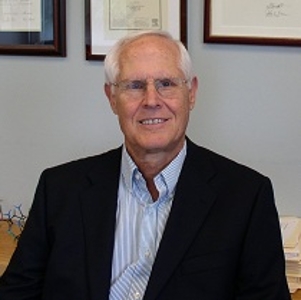Larry Overman

Larry Overman was born in Chicago, Illinois in 1943 and raised in Hammond, an industrial town in northern Indiana. In his late teens, he worked in the local steel mills to help pay for his education at Earlham College, a small liberal arts college in Richmond Indiana. After receiving his B.A. in 1965, he moved to the University of Wisconsin where he worked with Professor Howard W. Whitlock, Jr. For his dissertation, he studied in model systems the mechanism of the backbone rearrangement stage of steroid biosynthesis. In 1969 he moved to Columbia University as an NIH Postdoctoral fellow to study with Professor Ronald Breslow. He published in 1970 with Breslow a paper entitled “An Artificial Enzyme” that reported a hydrolytic catalyst that incorporated both a hydrophobic binding site and a metal-catalytic group. In 1971, he moved to join the six-year-old University of California campus at Irvine. He remained at UC Irvine for 50 years, closing his research laboratory in 2021. He is currently Distinguished Professor of Chemistry, emeritus at UC Irvine. Professor Overman was Chair of the UC Irvine Department of Chemistry from 1990–1993.
Professor Overman’s research interests center on the invention of new transformations and strategies in organic synthesis and the total synthesis of natural products and their congeners. Early in his career, Professor Overman invented a broadly useful method for preparing allylic nitrogen compounds from readily available allylic alcohols, now often referred to as the Overman rearrangement. Professor Overman and his co-workers developed a suite of cyclization reactions that create new heterocyclic and carbocyclic rings while controlling stereochemistry to an exceptional degree. One of these, the aza-Cope/Mannich rearrangement, has served as the cornerstone of total syntheses of more than a dozen alkaloids, highlighted by the first enantioselective total synthesis of strychnine in 1993. Professor Overman pioneered in the use of intramolecular insertion reactions of organopalladium intermediates for assembling complex polycyclic molecules, particularly those containing congested quaternary carbon centers. He reported together with Shibasaki the first catalytic enantioselective Heck reactions in xxxx, among the earliest catalytic enantioselective C–C bond coupling reactions. A highlight of his late research was the demonstration that complex fragments could be united by bimolecular coupling reactions of carbon-centered radicals using equimolar equivalents of the addends. Using synthesis strategies developed largely in his laboratory, Professor Overman and his coworkers completed total syntheses of more than 100 structurally complex natural products. Ninety Ph.D. students and more than 200 postdoctoral fellows trained in Professor Overman’s research laboratory.
Professor Overman is a member of the National Academy of Sciences, where he has served as Chair of the Chemistry Section, and the American Academy of Arts and Sciences. Overman’s scientific accomplishments were recognized by the three major international awards in organic chemistry: the Arthur C. Cope Award of the American Chemical Society (2003), the Tetrahedron Prize in Organic Chemistry (2008) and the ACS Roger Adams Award in Organic Chemistry (2015).
